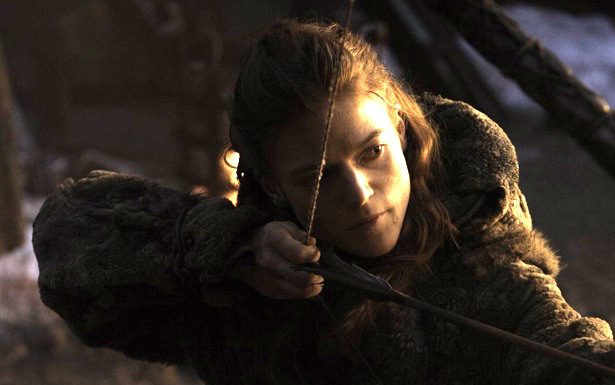From the window, to the Wall! Okay, now that I’ve got that out of my system I can review Game of Thrones.
The “crazy-ass penultimate episode” is a trope that Game of Thrones not only popularized, but pretty much invented. Season one’s “Baelor,” season two’s “Blackwater,” season three’s “The Rains of Castamere,” and tonight’s “The Watchers on the Wall” are all thrilling, jaw-dropping, and sometimes heartbreaking hours of television that prove that GoT is a singular entity, the most challenging show on the air right now.
Jon Snow might be the most boring character that Game of Thrones has to offer, but that is really no fault of Kit Harington (who does series-best work here) or George R.R. Martin; really, the show hasn’t given him much to do since his undercover wildling arc warapped up in season three. “Watchers” is an attempt to ameliorate that problem, and for the most part it succeeds.
The wildlings are ready for their long-promised attack on Castle Black. Ygritte in particular seems on the warpath, sharpening arrows and dishing out threats to Styr, the Magnar of Thenn. (I don’t know what that title means either, and I’ve read the book.) The problem with the wildlings is that for an army of a hundred thousand, we don’t get a good impression of more than a few of them: Ygritte, Thormund Gianstbane, Styr, and the departed Orell. Ciarin Hinds has been woefully underused as Mance Rayder. That being said, when the attack is signaled, by the lighting of “the biggest fire the North has ever seen,” it is undeniably impressive.
“The Watchers on the Wall” is ably directed by Neil Marshall, who also directed “Blackwater,” and it might be the most technically impressive hour that Game of Thrones has produced yet (it’s already been confirmed to be the most expensive). What really struck me wasn’t the action – which is spectacular – but the performances. John Bradley, as Sam, and Owen Teale, as Ser Alliser Thorne.
Bradley acquits himself nicely, showing decisively that Sam has grown a pair of balls. “Open the fucking gate!” he barks, when he sees Gilly attempting to enter Castle Black with her child. He has a lovely scene with Maester Aemon, where the old man tells him of a girl he once loved.
Teale finally gets to add dimensions to Ser Alliser beyond “contrarian douche.” He shows the qualities of – dare I say – a leader, and even exhibits some humility, admitting to Jon that he was right and the tunnel should have been closed. But it’s too late now, as about a million billion wildlings are at their door.
What happens next is, as my friend described it, what The Two Towers should have been. Marshall directs the siege and its resistance with aplomb, at one point taking the camera on an unbroken tour of the courtyard, showing us just how intense the battle really is (the shot calls to mind a similar sequence in The Avengers). There are several nice touches: enraged giants, barrels of flaming oil, archers hanging off the side of the wall, suspended by rope.
Ultimately, the Night’s Watch repels the horde – for now. But there is considerable collateral damage, the worst of which is Ygritte, who dies in Jon Snow’s arms. Harington and Rose Leslie have always had good chemistry together, and their last scene is no exception. “Let’s stay in that cave forever,” she whispers, before adding one last “You know nothing, Jon Snow.” Well, he knows how to not get shot by arrows.
To return to my Avengers comparison, Jon does a nice job of making himself this show’s Captain America. He’s moral, upstanding, and a natural leader. The men of the Watch flock to him after Ser Alliser is killed, and he is able to keep the wildlings at bay. Ultimately he knows that their defenses won’t hold, so he goes beyond the Wall to end the war by killing Mance Rayder. Whatever, fine. If it means more Ciarin Hinds I’m all for it.
“The Watchers on the Wall” obviously invites comparison to “Blackwater,” but I feel as though that’s unfair. “Blackwater” is, objectively, the better episode, as it afforded time to check in with several major players in King’s Landing: Joffrey, Cersei, Tyrion, Stannis, Sansa, the Hound, etc. “Watchers” is more self-contained, and does a fine job of visualizing the biggest action sequence from A Storm of Swords.


